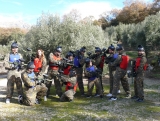You should familiarise yourself with all the required information. You might have doubts about what to do and what not to do when preparing for the dive. Here are the 10 basic tips for your first diving experience:
10 Tips for Your First Diving Course
1. Choose the Right Diving Centre
Once you’ve decided on the destination for your course, you should research and find out which are the best schools and the best instructors. Look for references! A more expensive course doesn’t necessarily mean a better one. Diving forums and user reviews will be your best allies in making a decision.
But that’s not all. It’s also important to choose the diving certification that best suits your preferences. If you don’t know the differences between PADI and SSI, here’s everything you need to know. It’s a very useful way to decide which course you’ll ultimately take.

When we submerge in water, we tend to hold our breath. It’s a reflex action, and for those who’ve done snorkelling, it might even feel natural. Remember, you’re carrying an air tank on your back, so breathe calmly.
Holding your breath unnecessarily can cause lung overexpansion, which is a diving accident. But don’t worry—the instructor will teach you and help you stay relaxed underwater.

When you dive, your body accumulates nitrogen, which gradually dissipates from your system. When flying, atmospheric pressure decreases compared to sea level, affecting the nitrogen in your body.
This can cause residual gas bubbles to expand and lead to decompression problems. That’s why it’s best to wait a certain amount of time after diving before boarding a plane.
Although opinions vary on the waiting time before flying after a dive, studies by DAN (Divers Alert Network) are the most widely accepted: after single no-decompression dives, the minimum recommended wait time before flying is 12 hours.

4. Ascend Carefully
Don’t rush back to the surface—your body isn’t used to such sudden pressure changes. A common rule is to ascend more slowly than the column of bubbles created with each exhale.

The pressure change when diving is very noticeable, especially in your ears, and can become quite uncomfortable. Prevent this by equalising your ears, balancing the pressure with the water. To do this, pinch your nostrils and blow gently through your nose.
It’s important to use this technique as soon as you start descending, not when your ears are already hurting. Equalise every half metre or so, and you’ll avoid ear discomfort during the dive.

6. Stay Hydrated and Avoid Alcohol
Hydration is always important, but it’s vital when diving. Make sure you drink plenty of water before and after a dive.
And we’re sorry to say, if you were thinking of having a beer after the dive, you might want to reconsider and opt for a refreshing bottle of water instead. You shouldn’t drink alcohol after diving (or before!), as alcohol is a blood thinner and can affect your body’s decompression.

7. Don’t Move Too Much
If you move too quickly—remember, water is about 800 times denser than air—you’ll tire out too soon and use up more air. Try to maintain a relaxed pace; you won’t want to miss the beauty of the seabed!
Move slowly—you’ll save energy and air, and you’ll be able to enjoy the experience longer without cutting the dive short. You can always use gentle fin kicks or follow the instructor’s lead.

8. Listen to the Instructor
This might seem like common sense, but it’s worth emphasising. The instructor is the most important person underwater. Follow all their instructions, and everything will go smoothly.
Don’t stray more than 10 feet away. Communication with the instructor is also crucial—use hand signals to let them know you’re okay. Following the rules is the most important part of a diving course.

9. Don’t Stress
Diving is very relaxing, and you shouldn’t stress about going underwater. It’s normal to feel nervous, but don’t worry—the instructor will help you stay calm and teach you how to use all the equipment and follow the diving process.

10. Never Take Anything from the Seabed
We know it’s tempting to take a souvenir, but the seabed should be preserved as much as possible. It’s our responsibility to respect the ecosystem we’ve entered. Keep the dive and the wonders you’ve seen in your memory without altering the environment. For sustainable diving!

Last but not least: enjoy! It’s a unique experience you’ll always remember. Diving is about having fun, not suffering. Relax and go for it!












